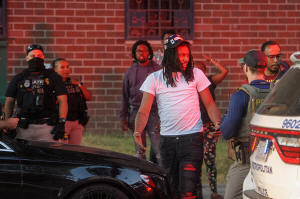What Americans think about Trump's handling of crime, according to a new
poll
[August 28, 2025]
By JILL COLVIN and LINLEY SANDERS
WASHINGTON (AP) — As armed National Guard troops patrol the nation's
capital as part of an unprecedented federal takeover of Washington's
police department, handling crime is now a relative strength for
President Donald Trump, according to the latest AP-NORC poll.
Americans are generally not happy about the Republican president’s
handling of issues like immigration and the economy but are more
positive about his tough-on-crime approach, according to the survey from
The Associated Press-NORC Center for Public Affairs Research.
Indeed, the vast majority of Americans, 81%, see crime as a “major
problem” in large cities — a concern Trump has seized on as he has
deployed the National Guard to the District of Columbia and threatened
to expand that model to cities across the country. Despite that
perception, data shows that violent crime in D.C. is at a 30-year low.
But Trump’s approach appears to be helping him, at least for the moment:
His overall approval rating has increased slightly, from 40% in July to
45% now.
But the poll shows there is less public support for federal takeovers of
local police departments, suggesting opinions could shift over the
coming weeks or months, depending on how aggressively Trump pursues his
threats.
For now, many Republicans in particular feel extreme action needs to be
taken, even as statistics show violent crime is down in Washington and
across the nation following a coronavirus pandemic-era spike.
"About damn time that somebody did something,” said Charles Arnold, 87,
a lifelong Republican who lives in San Diego.

Arnold, a retired electronics technician and veteran who served in the
Navy, said that it had been jarring to see the National Guard being used
for domestic law enforcement on U.S. soil but that the action seemed to
be necessary.
“That’s not what the armed forces are for. They shouldn’t be there. They
shouldn’t have to be there. The police should be allowed to police," he
said. “I detest the thought that it needs to be done.”
Handling crime is a strength for Trump
About half of U.S. adults, 53%, say they approve of Trump's handling of
crime, the poll finds.
That's higher than his approval rating on the economy, immigration and
the conflict between Russia and Ukraine — which are in line with his
overall approval rating.
Trump’s approach on crime is similarly popular among white and Hispanic
adults, with roughly half in each group saying they approve of the way
he’s handling the issue. Black adults, however, are substantially less
likely to say they’re on board with Trump's approach to crime, with just
27% in favor.
Trump also garners much stronger support from independents on crime than
on other issues. Roughly half of independents approve of his handling of
crime, compared with about 3 in 10 who approve of his handling of the
economy, immigration and the Russia-Ukraine war.
Most think crime is a ‘major problem’ for large cities
There’s broad agreement among Americans that crime is a significant
issue in large cities, even with incident numbers in decline.
That belief is especially pronounced among Republicans, nearly all of
whom see crime as a significant problem in large cities. Roughly 7 in 10
independents and Democrats agree.
Americans who live in urban areas are also more likely to say crime is a
“major problem” in their own communities.
[to top of second column]
|

A man has his car searched by multiple federal agencies including
Department of Homeland Security investigations, Bureau of Alcohol,
Tobacco, Firearms and Explosives (ATF) and the Washington Metro
Police Department in Washington, Monday, Aug. 25, 2025. (AP
Photo/Rod Lamkey, Jr.)

They include Tiana Parker, 30, a liberal Democrat who lives in the
suburbs of Seattle. Parker is dismayed by what Trump is doing in
Washington, D.C. — and his presidency overall — but nonetheless calls
crime “a major problem."
“I don’t feel safe going to Seattle, especially as a woman, at least not
by myself," said Parker, who said she was sexually assaulted on the
train several years ago. There was a deadly shooting at a strip mall
near where she lives last year, and there have been several times she
said she has been followed while walking down the street.
While she thinks crime needs to be addressed, she believes Trump's
approach is misguided and dangerous.
“What he is doing is a waste of resources, and he's not really attacking
the real problem. It's creating a real divide,” she said. “I think that
it is a gross lack of respect and trust towards his citizens."
That sentiment is shared by Mark Hackl, 49, an information technology
director who lives in Tulsa, Oklahoma, and was a lifelong conservative
Republican until 2016, when he left the party because he was dismayed by
Trump. He is now a registered independent.
“I think crime is always an issue that needs to be addressed," he said.
“I'm always pro-law and order, so to speak." But he said there comes a
point where the ends don’t justify the means.
“My raw emotion is I'm horrified by it," he said. “We’re not supposed to
allow the active military to function in the borders of the United
States.”
More think federal government should support police, rather than
taking over
Still, there are limits to what the public may accept. The poll finds
55% of U.S. adults believe it is “completely” or “somewhat" unacceptable
for the federal government to take control of local police departments,
as Trump has effectively done in Washington.

Republicans are overwhelmingly in favor of the federal government using
the military and the National Guard to assist local police, but even
they are more hesitant about the federal government taking control of
local police departments.
About half of Republicans find this to be acceptable, while about
one-third say it’s not. Democrats are broadly opposed to both.
For Republican David Gehret, 62, a maintenance technician who lives in
rural Narvon, Pennsylvania, what Trump is doing is spot on.
“Bring it on," he said. "Protect us.”
___
Colvin reported from New York.
All contents © copyright 2025 Associated Press. All rights reserved
 |